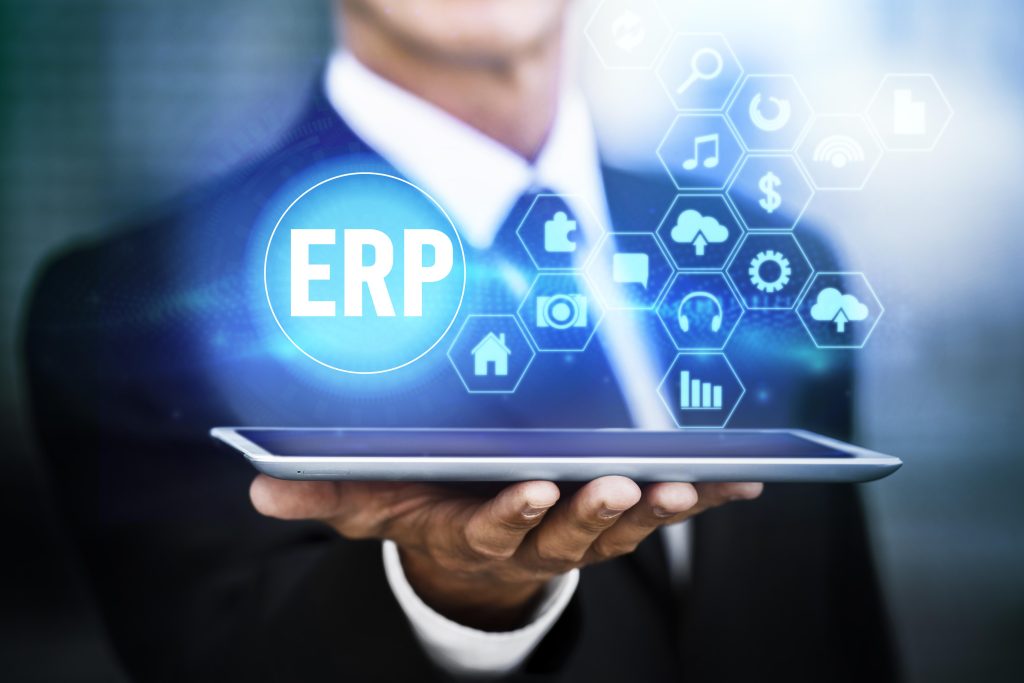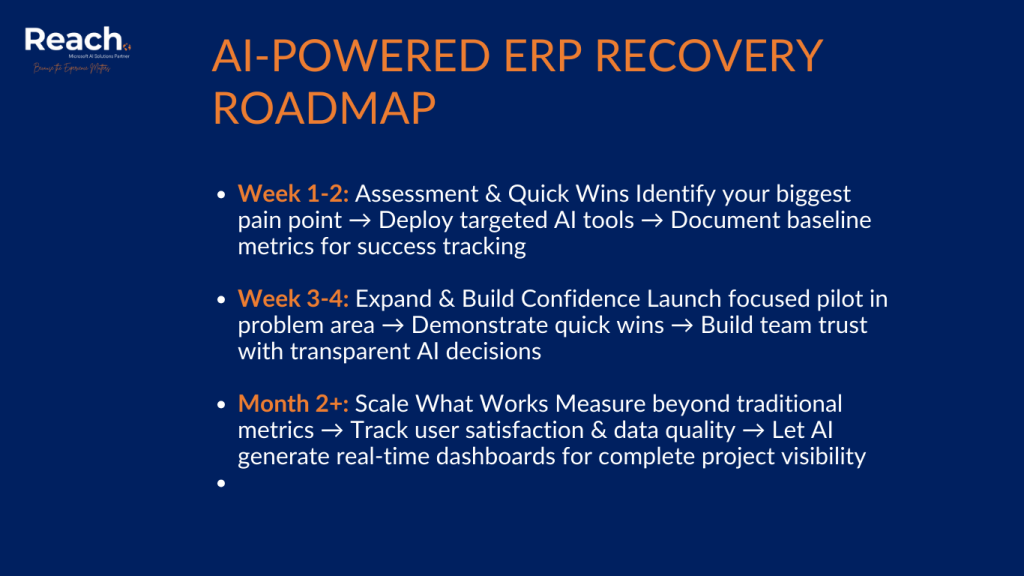Let’s face it: your ERP project isn’t going as planned. Maybe you’re months behind schedule, costs are spiraling, or user adoption is falling flat. You’re not alone. Studies show that 60% of ERP implementations fail to meet their original goals, and the consequences ripple through entire organizations—frustrated teams, lost productivity, and mounting pressure from leadership.
But here’s what we’ve learned after helping dozens of companies turn around struggling ERP projects: AI isn’t just another layer of complexity to add to your problems. When applied strategically, it’s the accelerator that can get you back on track.
Understanding Why ERP Projects Struggle
Before diving into solutions, let’s acknowledge the real challenges you’re facing. ERP implementations fail for predictable reasons: data migration nightmares where years of inconsistent information refuse to play nicely together; change resistance from teams who’ve developed workarounds they’re comfortable with; scope creep that turns a focused project into an unwieldy monster; and integration challenges that leave your systems speaking different languages.
The traditional approach to fixing these problems? Throw more people at it. Extend timelines. Increase budgets. But what if there was a smarter way?
Where AI Changes the Game
At Reach, we’ve seen AI transform struggling ERP projects in three fundamental ways. First, it dramatically accelerates data cleanup and migration. Second, it provides intelligent insights that help teams make better decisions faster. Third, it simplifies user adoption by making complex systems intuitive.
Consider data migration, often the most time-consuming aspect of any ERP project. Traditional approaches require armies of analysts manually reviewing, cleaning, and mapping data. AI can analyze millions of records in hours, not months, identifying patterns, inconsistencies, and anomalies that human reviewers might miss. We recently helped a manufacturing client reduce their data migration timeline from six months to six weeks using AI-powered data quality tools.
But AI’s impact goes beyond speed. It brings intelligence to every aspect of your ERP recovery.

Practical AI Applications for ERP Recovery
Intelligent Data Migration and Cleanup
Instead of manually reviewing thousands of vendor records or customer accounts, AI algorithms can automatically identify duplicates, standardize formats, and flag outliers for review. Machine learning models learn from your corrections, getting smarter with each decision you make. This means your team spends time on strategic decisions, not mundane data entry.
One of our retail clients discovered that what they thought would be a three-month data cleanup process took just three weeks with AI assistance. The system identified over 15,000 duplicate customer records and standardized address formats across 50,000 entries automatically, tasks that would have taken their team months to complete manually.
Automated Testing and Quality Assurance
Testing is another area where AI shines. Traditional testing requires creating hundreds of test scenarios, running them manually, and documenting results. AI-powered testing tools can generate test cases based on your business processes, execute them automatically, and even predict where failures are most likely to occur.
Key benefits we’ve consistently seen:
- 70% reduction in testing time through automated test case generation
- Early identification of high-risk areas before they become critical issues
- Continuous testing that runs in the background, catching problems immediately
- Self-documenting test results that create audit trails automatically
This predictive capability is particularly valuable. By analyzing patterns from similar implementations, AI can flag high-risk areas before they become problems. It’s like having a seasoned consultant who’s seen hundreds of implementations guiding your every step.
Smart Change Management
Here’s where AI becomes truly transformative for struggling projects. Change management isn’t just about training; it’s about understanding how your people actually work. AI can analyze user behavior patterns, identify resistance points, and personalize training recommendations.
We’ve implemented AI assistants that act as on-demand guides within the ERP system. When a user struggles with a process, the AI offers contextual help, suggests shortcuts, or even automates routine tasks. This reduces the learning curve dramatically and increases adoption rates.
Predictive Analytics for Project Management
AI doesn’t just help with technical aspects; it transforms project management itself. Machine learning algorithms can analyze your project data—timelines, resource allocation, task dependencies—and predict potential delays before they happen. This gives project managers the foresight to adjust resources, reset expectations, or accelerate specific workstreams proactively.
The Human Element: AI as an Enabler, Not a Replacement
It’s crucial to understand that AI doesn’t replace human expertise; it amplifies it. Your team’s deep understanding of your business processes, combined with AI’s ability to process vast amounts of data and identify patterns, creates a powerful synergy.
We’ve found that the most successful ERP recoveries happen when teams view AI as their co-pilot. The technology handles the heavy lifting—data processing, pattern recognition, automation—while humans focus on strategy, relationships, and complex decision-making that requires business context and intuition.
Getting Started: A Practical Roadmap

If you’re ready to leverage AI to recover your ERP project, here’s a practical approach we’ve refined through experience:
Week 1-2: Assessment and Quick Wins
- Identify your biggest pain point (usually data migration or testing bottlenecks)
- Deploy AI tools for immediate impact in that specific area
- Document baseline metrics to measure improvement
Week 3-4: Expand and Build Confidence Start with a focused pilot in one problematic area. This allows you to demonstrate quick wins without overwhelming your already stressed team. Show your team how AI makes decisions—when they understand the logic, they’re more likely to trust and adopt the technology. We always recommend starting with AI recommendations that humans verify before moving to more automated approaches.
Month 2 and Beyond: Scale What Works Measure everything that matters. Track not just traditional metrics like go-live dates and budget adherence, but also user satisfaction, data quality scores, and process efficiency improvements. AI can help here too, automatically generating dashboards that give you real-time visibility into project health.
The key is to invest in the right partnerships. Not all AI solutions are created equal, and not all consulting partners understand how to blend AI with ERP effectively. Look for partners who bring pre-built AI models trained on similar implementations, not just generic tools.
Real Results We’ve Seen
The impact of AI on ERP recovery isn’t theoretical. Here’s what our clients have experienced:
- A distribution company reduced their go-live delay from 8 months to 2 months by using AI for data migration
- A healthcare organization achieved 85% user adoption in the first month (industry average is 40%)
- A manufacturing firm cut their testing phase in half while actually improving quality
- A retail chain saved $2.3 million in consulting fees by automating routine configuration tasks
These aren’t outliers—they’re becoming the new normal for companies that embrace AI in their ERP recovery efforts.
The Path Forward
Your struggling ERP project doesn’t have to become another statistic. With AI as your ally, you can accelerate timelines, improve quality, and increase adoption rates simultaneously. The key is starting now, even in small ways.
At Reach, we’ve built AI into our approach from day one because we’ve seen its transformative power firsthand. As a Microsoft partner, we leverage the full ecosystem of cloud ERP, CRM, and automation tools, with AI woven throughout. This isn’t about adding complexity; it’s about using intelligence to simplify and accelerate your path to success.
The question isn’t whether AI can help recover your ERP project—it’s how quickly you can start leveraging its power. Every day you wait is another day of mounting costs, frustrated users, and missed opportunities. But every day you move forward with AI is a step closer to the successful implementation your organization deserves.
Your ERP project can still succeed. With the right blend of AI technology, human expertise, and practical methodology, you can turn today’s challenges into tomorrow’s competitive advantages. The recovery starts with a single decision: choosing to work smarter, not just harder.
Ready to explore how AI can transform your ERP project? Reach brings together Microsoft’s powerful cloud platform, proven implementation expertise, and AI-first thinking to help you succeed. Let’s discuss how we can help you move from struggling to thriving.

